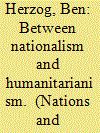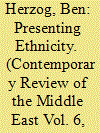| Srl | Item |
| 1 |
ID:
086958


|
|
|
|
|
| Publication |
2009.
|
| Summary/Abstract |
The public and researchers alike view global/humanitarian and local/national logics as based on different, and even contradictory, regimes of justification. In this paper, however, I argue that these logics are complementary in the case of refugees. By asking 'who is a refugee?' within the Israeli case study, I empirically ground the claim that nationalism and humanitarianism should be grasped as Glocal. Content analysis of the Israeli case reveals how the Israeli establishment 'translates' the universal notion of humanitarianism. Humanitarian discourse does not offer an answer to the refugee problem by invoking a universal identity, nor is it just a euphemism for particularistic interests. On the contrary, the humanitarian logic is in fact based on the national order, and does not attempt to replace it. The political meaning of the term 'refugee' is an endless transcription of the national logic, and thus cannot be cosmopolitan.
|
|
|
|
|
|
|
|
|
|
|
|
|
|
|
|
| 2 |
ID:
169985


|
|
|
|
|
| Summary/Abstract |
In 1950, Israel enacted the Law of Return and 2 years afterwards passed its Citizenship Law. These measures reflected the Zionist goal of encouraging Jewish immigration to Israel/Palestine, so citizenship was mostly limited to Jews. In other words, an ascriptive/ethnic classification was at the foundation of Israeli citizenship. This article explores the construction of the citizenship laws in relation to various forms of categorization—biological descent, cultural belonging, racial classifications, and voluntary affiliation. It asks how the Israeli citizenship policy was presented and which mechanisms were employed in order to justify the incorporation of all Jews, including those from Arab countries, while attempting to exclude non-Jews. After analyzing official state policies and parliamentary debates in Israel regarding the citizenship laws, I present the mechanisms employed to present the ethnic immigration policy. Those mechanisms include emphasizing the positive and democratic sides of allowing Jewish immigration; repeatedly avoiding the usage of racial terminology; highlighting the willingness to incorporate non-Jewish residents; and employing security justifications when prohibiting non-Jewish immigration. Being the Jewish State, Israel wanted to favor Jews in its immigration and naturalization policies. However, being also committed to democratic values and principles, it desired to disassociate itself from racial attitudes.
|
|
|
|
|
|
|
|
|
|
|
|
|
|
|
|